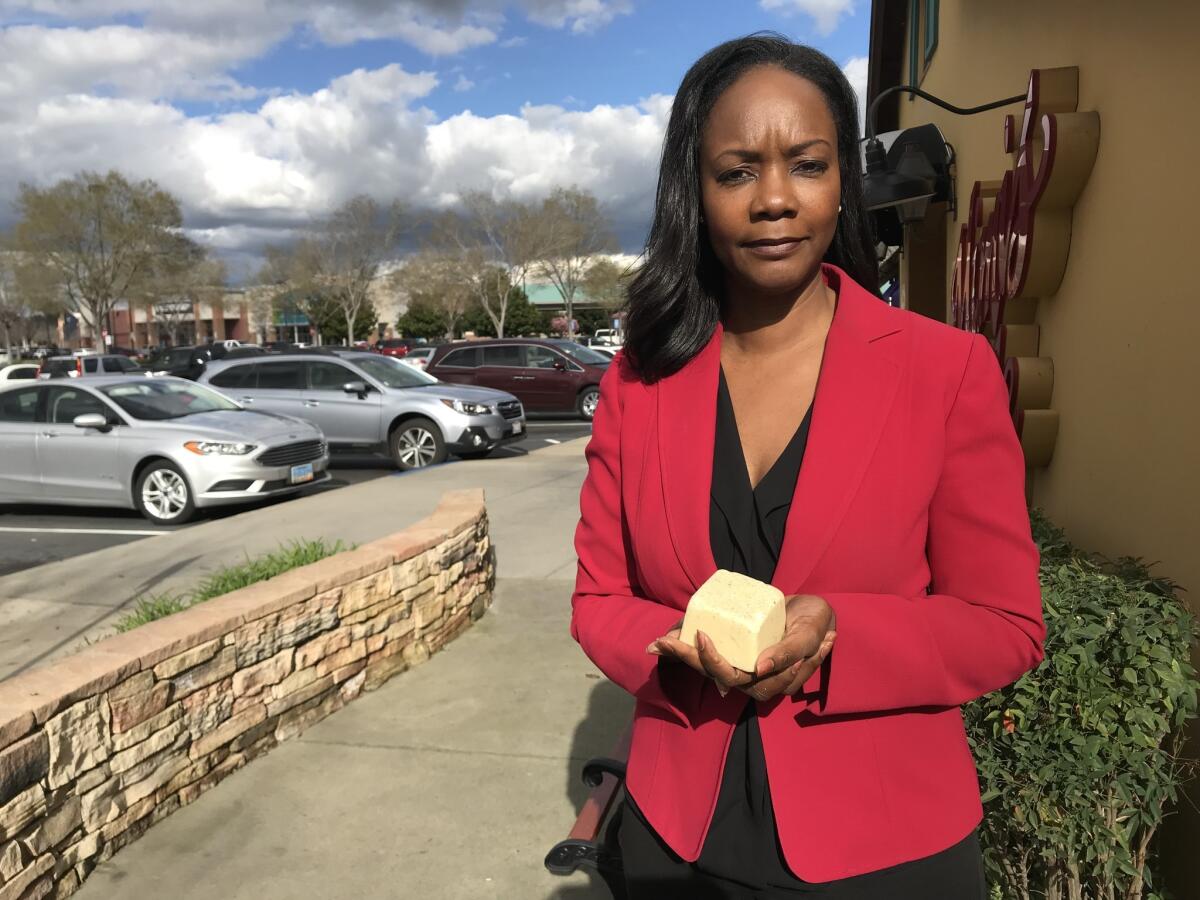Column: A woman’s past abuse is triggered by a TSA pat-down at LAX. She wants some answers

Reporting from Elk Grove, Calif. — It was the end of an uneventful business trip. Tracie Stafford, who teaches communications skills to corporate and political clients all over the country, arrived at Los Angeles International Airport around 9 p.m. for her flight home to Sacramento on Feb. 26. She got into the Transportation Security Administration screening line.
One hour later, she was on a bench outside the Delta terminal, weeping and shaking, unable to think straight. She had missed her 9:55 p.m. flight — the last one out — and had to find a hotel room. She has been in a state of emotional turmoil ever since.
What happened in that TSA line?
Stafford recounted her story to me, first by phone, then over lunch Friday in the Sacramento suburb of Elk Grove, where she lives with her husband and three of their four children. She has also told the story in three installments on her Facebook page, starting the night she missed her plane.
Christina Harbridge, her boss at the San Francisco-based communications consulting firm Allegory Inc., and the company’s director of operations, Debbie Higoy, were on the phone with Stafford at different points during and after the screening. Both confirmed her account.
A survivor of brutal childhood abuse, domestic violence and sexual assault who often speaks publicly about her experience, Stafford was unexpectedly reduced to powerlessness, fear and confusion by a TSA screening that triggered her long-ago trauma.
“I’ve worked through a lot of this stuff,” she told me. “So imagine what it’s like for people who are not dealing with their junk.”
::
Here is her version of what happened:
She walked through the screening machine, and then was patted down. She was mildly put off by the way the agent rubbed her stomach. She put her shoes and coat back on and called Higoy to catch up about work and family. It was then that she realized her carry-on had been flagged. During a second screening, it triggered some sort of alarm. When an agent opened her bag, he found an expensive block of soap.
“He pulled out my Buffy Bar and said, ‘This is why it went off.’”
(Buffy Bars, made by Lush Cosmetics, have kind of a cult following. People with skin issues extol their virtues. It’s not clear why it looked suspicious.)
Stafford and Higoy hung up, they both said.
Stafford was told that the agent had to call a supervisor, who requested a more thorough screening. She was mortified to have her sweaty workout clothes and inside-out undies handled, but joked her way through. “Well, that’s not awkward,” she remembers saying.
The supervisor, she was told, had to call a manager, which could take between 10 and 30 minutes. “That’s when I got nervous,” she said.
Also, she would have to have another, more thorough body search. At no point, despite asking, was she given an explanation for any of it.
“I began to panic,” she told me. “I saw those gloves and everything else went gray. That’s when I said, ‘I’m a survivor of sexual assault and domestic violence, and I don’t know if I can go through this.’”
She began to shake and cry, she said. She tried to call her boss, but Harbridge was on a plane to San Francisco, so she left a voicemail.
She was asked if she’d like to go into a private room.
“I was like, ‘Are you kidding?’ When you are afraid, or being assaulted, you never go to a second location,” she said. “You fight for your life where you are.”
During the second pat-down, the agent ran her hands between Stafford’s legs and up the crease of her backside. Stafford lost it.
“My nose was running and I didn’t wipe it. I was openly weeping.”
The tall, well-dressed black woman was frozen. She could not flee, nor could she fight.
“I could never forget that I am black,” she said. “That’s a factor. Also, I am 5 foot 10. My height does intimidate people. And there’s the stereotype of the angry black woman, so we have to be overly cautious.”
When the TSA manager, Carl Gomez, finally arrived, it took only moments before he said she was free to go. He gave her his business card. By then, however, her flight had departed. And she was a tear-stained mess.
“I couldn’t even figure out how to leave the terminal,” she said. “So the supervisor came over and walked me out.”
She sat on a bench outside the terminal, confused. Just then, Harbridge, who had landed, returned her call.
“When I got her voicemail, I could not understand what she was saying,” Harbridge told me. “I had never heard her cry like that. I thought she had been attacked.”
Harbridge sat on the floor at SFO and kept Stafford on the phone while she arranged a hotel room and cab ride on her laptop. “We were on the phone at least an hour. I was trying to get her to explain what happened because she was not thinking clearly. With the amount of training that TSA does, it was shocking to me that they did not change their strategy after she verbalized how traumatic it was.”
::
The TSA is supposed to be solicitous of people with obvious disabilities or medical conditions, but what about those who suffer from post-traumatic stress?
It’s not just war veterans who are affected. There are, walking among us, people with all sorts of invisible but very real wounds inflicted by violence and abuse.
On March 4, Stafford filed a complaint with the TSA and asked for the video of the encounter. A week later, she received a response from the TSA’s Office of Civil Rights and Liberties. Her complaint was reviewed by the TSA’s Disability Branch, and has been forwarded to the TSA’s customer support manager for LAX. If she does not receive a response “within a few weeks,” the email said, “please feel free to contact the TSA Contact Center.”
I emailed the TSA manager who was on duty the night of Stafford’s ordeal, and also reached out to the TSA regional spokesman. Neither responded.
So I called the “TSA Cares” line, and spoke to a representative who told me that anyone with an aversion to being patted down, for whatever reason, can alert the TSA in advance. You can notify the officers, who will offer a private room. But you may still have to be patted down, which can involve the front of an officer’s hand on what she called “sensitive” areas. You can also request a passenger support specialist to be at your side.
She sent me an email about the protocol that states, “If you are required to undergo a pat-down and have anxiety, post-traumatic stress disorder, an aversion to being touched, or have experienced sexual trauma, please notify a Transportation Security Officer before screening begins. TSOs are required to be courteous and respectful and are trained to explain what they are doing and what will happen next in the process.”
But as Stafford told me, it’s very common for an abuser to tell a victim what he’s going to do to her before he does it, so spelling things out as they are happening can make things worse.
It appeared, from what Stafford told me, that the TSA agents followed the rules. Yet if an experienced traveler ends up traumatized, I would like to suggest that a new protocol for victims of sexual assault or domestic violence is in order.
As Stafford put it, “If the only accommodation is the private room and telling you step by step how you will be violated, they need to go back to the drawing board.”



